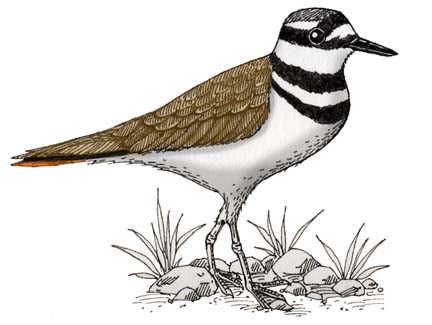

They breed in summer from Alaska across Canada, south to Mexico and on some Caribbean Islands. In the winter, they can be found in southern British Columbia south through the western U.S., the Midwest and in the east from Massachusetts south to northern South America.
They live in fields, mudflats, pastures, sports fields, parking lots and golf courses.
They are brown above and white below with two black bands around their neck and breast. Their faces have a black stripe between their eyes, a white stripe across their forehead, behind each eye and around their neck. The top of their tail is rusty colored. Males and females look alike.
They pretend a wing is broken to lure predators away from their nest.
They eat worms, snails, insects and seeds.
Their nest is just a dent in the ground. The female lays 4-6 tan eggs with brown spots.
Kingdom: Animalia
Phylum: Chordata
Subphylum: Vetebrata
Class: Aves
Order: Charadriiformes
Family: Charadriidae
Genus: Charadrius
Species: C. vociferus
When you research information you must cite the reference. Citing for websites is different from citing from books, magazines and periodicals. The style of citing shown here is from the MLA Style Citations (Modern Language Association).
When citing a WEBSITE the general format is as follows.
Author Last Name, First Name(s). "Title: Subtitle of Part of Web Page, if appropriate." Title: Subtitle: Section of Page if appropriate. Sponsoring/Publishing Agency, If Given. Additional significant descriptive information. Date of Electronic Publication or other Date, such as Last Updated. Day Month Year of access < URL >.
Amsel, Sheri. "Killdeer" Exploring Nature Educational Resource ©2005-2024. December 13, 2024
< http://www.exploringnature.org/db/view/168 >

